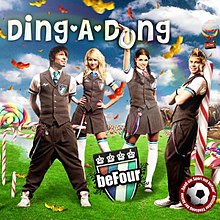Ding-a-dong
|
|
|
|---|---|
 |
|
| French 7" single cover. | |
| Eurovision Song Contest 1975 entry | |
| Country | |
| Artist(s) |
Getty Kaspers,
Ard Weeink, Chris de Wolde, John Gaasbeek, Koos Versteeg, Rudi Nijhuis |
| As | |
| Language | |
| Composer(s) |
Dick Bakker
|
| Lyricist(s) |
Will Luikinga, Eddy Ouwens
|
| Conductor |
Harry van Hoof
|
| Finals performance | |
| Final result |
1st
|
| Final points |
152
|
| Appearance chronology | |
| ◄ "I See a Star" (1974) | |
| "The Party's Over" (1976) ► | |
| "Ding-A-Dong" | ||||
|---|---|---|---|---|
 |
||||
| Single by beFour | ||||
| from the album Friends 4 Ever | ||||
| Released | 17 April 2009 | |||
| Format | CD single | |||
| Recorded | 2009 | |||
| Genre | Pop | |||
| Length | 3:32 | |||
| Writer(s) | Will Luikinga, Eddy Ouwens | |||
| beFour singles chronology | ||||
|
||||
"Ding-a-dong" (original Dutch title: "Ding dinge dong", as it was introduced in the titles when broadcast) was the title of the winning song in the Eurovision Song Contest 1975. It was sung by Teach-In, representing the Netherlands, and was written by Dick Bakker, Will Luikinga, and Eddy Ouwens. The song reached number 1 in both the Swiss and the Norwegian Singles Chart.
"Ding-a-dong" was notable for being one of the Eurovision winners that had quirky or entirely nonsensical titles or lyrics, following in the footsteps of Massiel's "La La La" in 1968 and Lulu's "Boom Bang-a-Bang" in 1969, later followed by the Herreys' "Diggi-Loo Diggi-Ley" in 1984. "Ding-a-dong" was performed first on the performance night (preceding Ireland's The Swarbriggs with "That's What Friends Are For"). The song was the first winner under the now-familiar Eurovision voting system whereby each country awards scores of 1-8, 10 and 12. At the close of voting, it had received 152 points, placing first in a field of nineteen. As the first song performed during the evening, the victory ran contrary to the fact that success usually went to songs performed later in the broadcast. According to author and historian John Kennedy O'Connor's The Eurovision Song Contest - The Official History, this was the first of three occasions when the first song would win the contest, the second coming the following year in 1976,and the third in 1984.
The song, performed entirely in English, was an up-tempo ode to positive thought; though ironically, the song is written entirely in a minor key. The band (only the second to win the Contest in a non-native language after ABBA the year before) sings that one should "sing a song that goes ding ding-a-dong" when one is feeling unhappy, and continues "Ding-a-dong every hour, when you pick a flower. Even when your lover is gone, gone, gone." On the night of the Dutch National Song Contest, with the song already having been selected, Albert West and Debbie competed with Teach-In for the honour of performing.
...
Wikipedia
